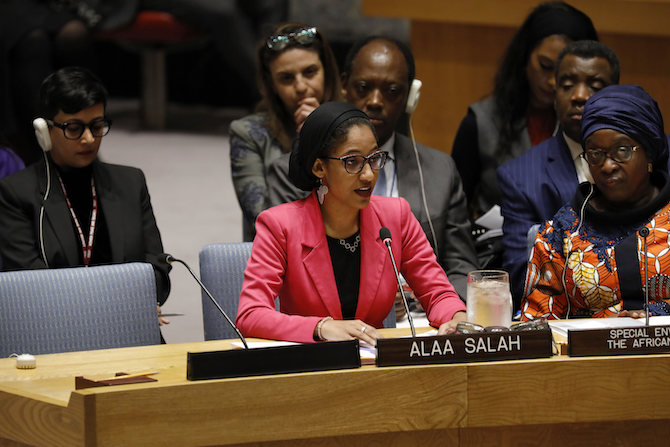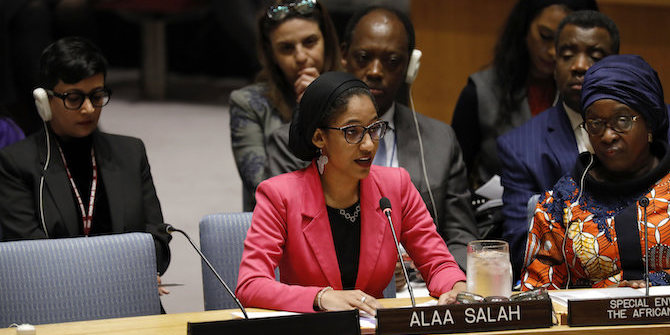by Dr Souad Mohamed & Aida Abbashar

Women’s leadership issues have rarely received the research attention they deserve. In the Middle East and North Africa (MENA) region, the lack of research on women’s leadership and career development is particularly pronounced. Seven years after the creation of the 17 Sustainable Development Goals, explanations for closing the gender gap at the highest level of leadership remains unaddressed. A 2015 report by the McKinsey Global Institute revealed that progress towards achieving gender equality could increase global GDP by $12 trillion by 2025. It is therefore imperative to discard this inaccurate notion that underestimates women’s participation in the process of economic development and to further investigate the vast gender gap that remains.
The existing research devoted to investigating the presence of women in leadership positions unequivocally disregards the importance of understanding the barriers and enablers to women’s leadership in Sudan. As a result, the realities, presence and challenges those Sudanese women leaders face remain understudied and unrecognised by academics and policymakers alike. Sudan has long been beset by conflict which has disproportionately impacted Sudanese women. Following the fall of Sudanese President Omar-al-Bashir in April 2019, calls for Sudanese women to occupy senior leadership roles are now undoubtedly louder than ever before. The Sudanese Women’s Declaration for Change No (1) of 2019 demanded the representation of women in all sectors at decision-making positions. Sudanese cities have thus witnessed political uproar as Sudanese women demonstrate their serious intent to attain a fair representation in political and governmental spheres.
For many Sudanese women, tackling the gender gap has been a strenuous task as progress has been marginal. Several crises have hindered women’s leadership development. For instance, the October 2021 coup witnessed the removal of the country’s ministers, four of which were women, from some of the top leadership positions in the country. In addition, as the COVID-19 pandemic progressed from a global health crisis into a social-economic one, women’s labour force participation in developing countries across the MENA region became even more precarious. Nonetheless, Sudanese women continue to strive for leadership positions. Given the country’s current context, the barriers experienced by Sudanese women may be even more pronounced, making efforts to improve gender equality more important than ever.
The research project ‘Understanding Barriers and Enablers to Women’s Leadership in Sudan’ is a collaboration with the LSE Middle East Centre, IEL International, and the University of Khartoum, funded by Ethar. The project aims to explore the barriers and enablers of women’s advancement within Sudan. Through qualitative research design, the research team will examine and identify the most significant barriers and enablers to women’s leadership in Sudan by gathering views from a panel of experts across multiple sectors.
This project aims to make an original contribution to the existing studies in the MENA region by investigating the low representation of women in leadership roles in the neglected area of Sudan. Whilst exploring the extent to which Sudan has a similar context to other Arab and MENA countries with regards to women’s leadership development, the project will also reveal how the limitations of existing studies on Sudanese women have delayed their advancement. This is particularly relevant as existing research has hyper-focused on barriers rather than the enabling factors that will empower women.
This approach acknowledges that the experiences of Sudanese women are unique, both in relation to the MENA region and the rest of the world, and therefore deserve to be studied in their own right. The research questions posed by this project will help shed light on some of the gaps in the existing literature on women’s leadership in the MENA region, and specifically in Sudan. If this gap is not addressed, future generations of Sudanese women and girls may not obtain the leadership positions they rightfully deserve.
The transitional government period undergone in Sudan has revealed the vast amount of exceptionally talented young women. Understanding how to support their leadership advancement, recognising and addressing the challenges to women’s leadership is more urgent now than ever. Sudan’s current political situation has signalled the importance of building academic knowledge, theorising women’s empowerment in leadership, and guiding action among business practitioners, professional bodies, NGOs, governments, and individuals who aspire to advance in their careers.
This blog post introduces the research project ‘Understanding Barriers and Enablers to Women’s Leadership in Sudan’ conducted in collaboration between the LSE Middle East Centre, IEL International in the UK, the University of Khartoum, Sudan and Funded by Ethar, UK.







Thanks for shedding the light on such an important subject that has been deliberately ignored and neglected for a long time. Women in Sudan have been pioneers to the MENA and Africa region in the past; when the country had the first Female social Constitutional council member (Senator.Fatima A. Ibrahim) and the first ever Female Supreme Court Justice in Africa ( Justice Ihsan M. Fakhry). It is imperative to reveal the culprit behind the stunting of Sudanese female leadership movement and prosperity. I congratulate the distinguished ladies conducting this unprecedented and invaluable research. I can’t wait to learn the results.